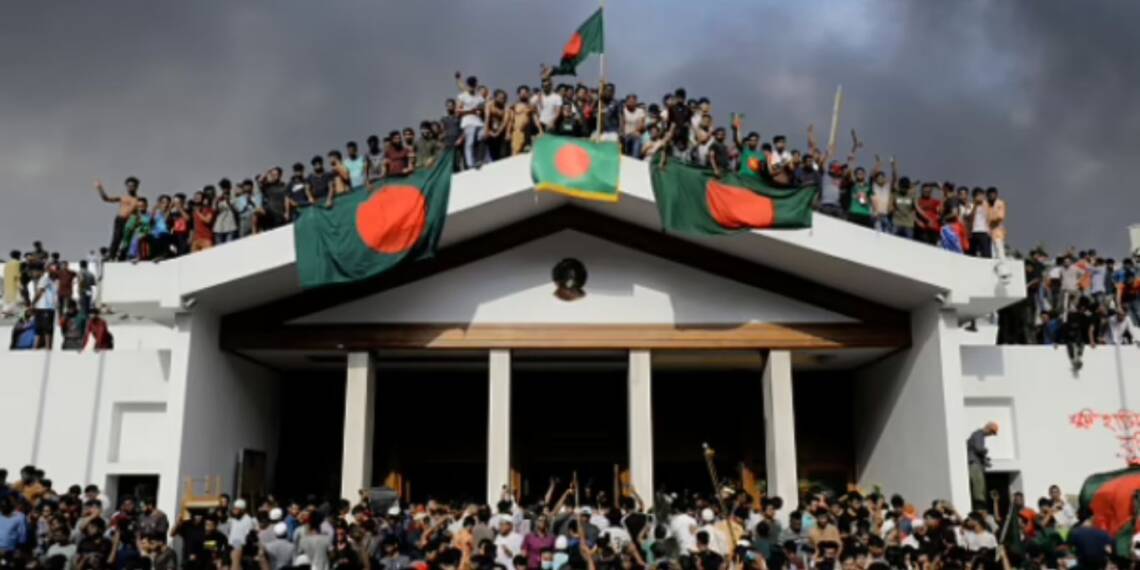India’s immediate neighbour Bangladesh is facing an acute food crisis amid increased religious tension in the country. For Bangladesh, the domestic and regional situation is highly unstable, and the effects of these have started to have repercussions on Bangladesh’s trade and food. In recent weeks, the shortage of food has become one of the areas of concern for the newly formed Interim government under Mohammad Yunus. Despite robust trade relations with India, the real threat to its food security has emerged from Myanmar. This month, the Arakan Army, a rebel force fighting against the Junta, captured the Rakhine state, especially the Myanmar border with Bangladesh, from the military, which possibly caused the disruption to the rice flow from Myanmar to Bangladesh.
The Geopolitical situation
Bangladesh is being directly affected by the dire situation in its border regions. The current condition in neighboring Myanmar and the behaviour of radical groups in Bangladesh have brought this precarious food situation in Bangladesh. The Arakan Army has extended its control over the Rakhine state and is responsible for controlling the 270 km long boundary with Bangladesh.
The rebel group also claims to have taken control of the western command of Myanmar’s military Junta. As a result, Bangladesh’s already limited rice supply is affected. Rice, a staple part of Bangladeshi food, makes for a sizable share of the country’s food imports, and Myanmar has been a key provider. However, with the Arakan Army controlling the major port of Mongdo, as well as key customs processes, Bangladesh’s rice supplies from Myanmar are severely restricted.
This new development in Myanmar arrived amid Bangladesh grappling with a growing shortage of rice. In order to mitigate food shortages, Bangladesh has requested an additional fifty thousand tons of rice from its immediate neighbour, India.
The request from Bangladesh comes in the middle of the deteriorating relationship between India and Bangladesh over the condition of minorities, especially Hindus in Bangladesh. Mohmmad Yunus’s government has asked for the extradition of former Prime Minister Sheikh Hasina from India, an action that has strained diplomatic ties.
The relationship with Myanmar is also strained on the issues of recognition of the Arakan Army and the issue of Rohingya refugees in Bangladesh. The Arakan Army, which is primarily comprised of ethnic Rakhine Buddhists, is reportedly enraged by Bangladesh’s refusal to engage with them. This has forced the Arkan Army to stop the delivery of rice and other essential supplies from Rakhine state to Bangladesh, which intensified the country’s food insecurity.
The Domestic Reasons
Another reason behind the food shortage is Rohingya refugees in Bangladesh. A large number of refugees from another country puts an extra burden on the national resources of the host country, and Bangladesh is not an exception. The government exports or imports food and other supplies according to their population requirements, but a large number of refugees can create a situation where governments fail to read the actual requirements of the country.
Approximately 1 million Rohingya Muslims have fled Myanmar’s violent military crackdowns, seeking safety in Bangladesh’s Cox’s Bazar region. In recent days, Bangladesh has reported an influx of roughly 60,000 new Rohingya refugees from Myanmar due to the recent advancement of the Arkan Army in the Rakhine state. The Arakan Army has long been in problem with Myanmar’s military over the treatment of Rohingya Muslims, escalating the region’s political and humanitarian crisis. This put an extra burden on Bangladesh, which Bangladesh failed to comprehend the situation due to the lack of experience in the new interim government.
Myanmar’s refusal to take back refugees, along with instability in the region, has put extra pressure on Bangladesh’s national resources, especially food. Recently, Bangladesh has also faced a number of natural disasters, such as floods, cyclones and landslides, which have resulted in loss of life and crops. In an already fragile situation, the disruption of rice imports from Myanmar and the extra resource burden by refugees have created food shortages in Bangladesh.
India’s response
Despite repeated attacks on Hindu minorities in the country and instigating India by posting distorted maps from the members of the interim government, India has not changed its stance on its trade relationship with Bangladesh. Last week, Indian Ministry of External Affairs spokesperson Randhir Jaiswal stated, “Trade between Bangladesh and India continues to function, and articles of trade are plying between both countries. There may be issues here and there, but by and large, trade is happening”, which shows India’s commitment towards a stable Bangladesh.
Despite the regional and geopolitical issues between the two countries India has continued to manage the relationship in a rational and reasonable manner with firm commitments to International laws and regional treaties. It is expected, as always, that India will step up to help its immediate neighbor in this challenging time.
The sudden ouster of Shiekh Hasina and the behaviour of the new government’s members in Dhaka have created diplomatic crisis for Bangladesh, and the citizens of Bangladesh are feeling the far reaching and devastating effects in the forms of violence and food shortages.








